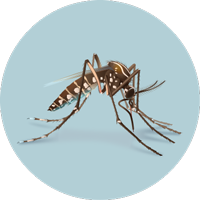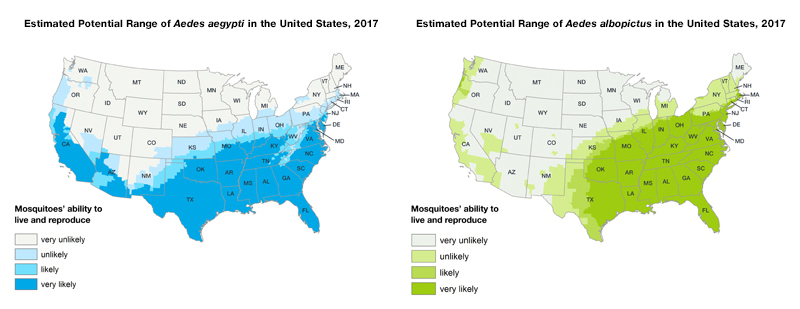
Mosquito season in the U.S.
Mosquito season in the United States generally runs from April through November, depending on location. In some parts of the U.S., it is always mosquito season. The Zika virus remains a concern.
With a warming climate, the mosquitoes that carry Zika virus, Aedes aegypti, have greatly expanded the areas in which they can live.
The maps below show the range of these mosquitoes as of 2017, but these ranges have already grown. For example, Aedes aegypti mosquitoes were recently found in Nebraska.
Because of the warming climate, it is expected that these types of mosquitoes will be able to keep expanding their range to more states.

How do you get the Zika virus?
Mosquitoes, of species either Aedes aegypti or Aedes albopictus, infected with the Zika virus transmit the virus when they bite people. These kinds of mosquitoes have the ability to carry other mosquito borne diseases like dengue fever of chikungunya. And unfortunately, they bite both during the day and at night, meaning you have to vigilant throughout the day.
Pregnant women face the greatest risk from Zika infection. A report from the Centers for Disease Control and Prevention (CDC) found that among women with a confirmed Zika infection during the first trimester, 8 percent had a baby or fetus with Zika related birth defects. The report found that for infections in the second trimester, 5 percent of babies or fetuses were affected, and in the third trimester, 4 percent.
Pregnant women can pass the virus on to their babies during pregnancy or at birth. The Zika virus has also been found in breast milk, but it is not yet known if the virus can transmit to a baby through breast feeding.
The virus is also transmitted through sex with an infected partner. It is important to know that Zika can be passed from an infected person before they show symptoms, while they show symptoms and after the symptoms go away. Studies are ongoing to determine how long a person who has had the virus remains infectious.
The Zika virus may also be able to be transmitted through blood transfusions. There have not been any cases in the United States, but there have been possible cases of this type of transmission in Brazil.
We recommend visiting the CDC website for the most up-to-date and detailed information about the virus:
http://www.cdc.gov/zika/about/overview.html
If you will be traveling, please click the following link for CDC issued Travel Notices:
https://wwwnc.cdc.gov/travel/page/zika-travel-information
Preventing mosquito bites is one critical way to help protect yourself and your loved from the Zika virus.

Leave a Reply
Your email is safe with us.